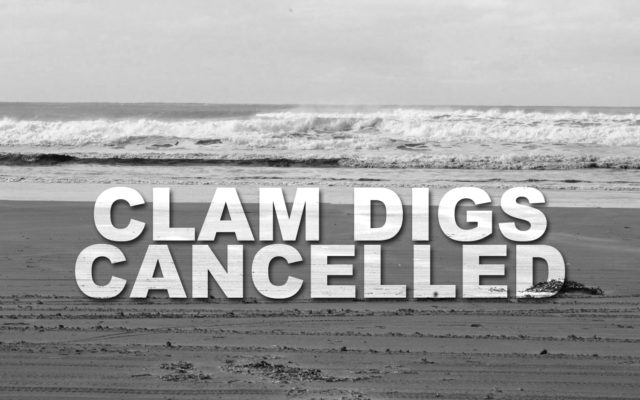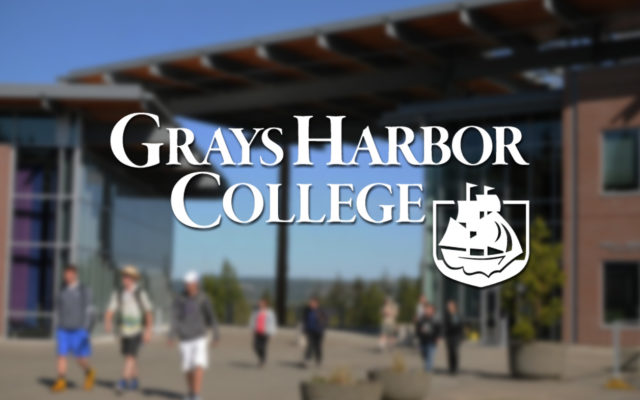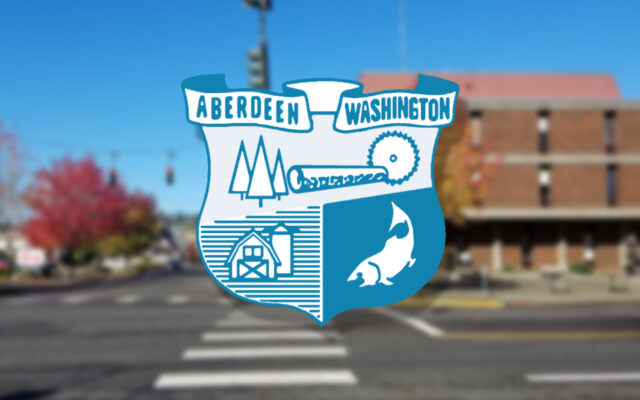Domoic acid closed the Wednesday clam dig; upcoming dig status unknown

Increasing levels of marine toxins caused clam digs to be canceled on Wednesday. What this means for upcoming digs is not yet known.
Wednesday afternoon, the Washington’s Department of Health (DOH) canceled the evening digs on local beaches after recent toxin tests determined razor clams contain increasing levels of domoic acid.
Domoic acid, a natural toxin produced by certain types of marine algae, can be harmful or even fatal if consumed in sufficient quantities.
It’s not known where the higher-than-normal results were located, but as a result, state health officials and shellfish managers closed all ocean beaches to razor clam digging, including digs scheduled at Long Beach, Twin Harbors, and Copalis.
“State shellfish managers will consider openings tentatively scheduled to start October 31, depending on the results of upcoming marine toxin tests and public health officials’ ongoing monitoring of COVID-19 trends,” said Larry Phillips, WDFW’s coastal region director.
The department will make an announcement next week on additional digs.
More information about domoic acid, as well as current levels at all ocean beaches, can be found on WDFW’s webpage at http://wdfw.wa.gov/fishing/shellfish/razorclams/domoic_acid.html.
Final approval of tentatively scheduled openings depends on results of marine toxin tests.
While digging has been scheduled, the digs are contingent upon continued guidance by public health officials monitoring COVID-19.
“Close Proximity Can Accelerate The Spread Of COVID-19, So We’re Asking The Public To Take Steps To Thoroughly Prepare For Their Visits To Avoid Increasing Risk,” Said Larry Phillips, Washington Department Of Fish And Wildlife (WDFW) Coastal Region Director, Who Notes That The Department Is Being Guided By Risk Assessments By Local And State Health Officials.
Health agencies are asking people to:
- Stay home if sick,
- Practice social distancing of at least six feet,
- Mask up,
- Bring Personal Protective Equipment like hand sanitizer,
- Leave no Trace: Pack out belongings and garbage,
- Purchase licenses ahead of the trip,
- Bring non-cash payment methods to reduce contact, and
- Follow local ordinances and guidelines.
“Abundant Razor Clam Populations Are Allowing For Numerous Digging Opportunities This Year,” Said Coastal Shellfish Manager Dan Ayres. “But, It Is Important That Clam Diggers Only Dig Where It Is Allowed, Pay Close Attention To The Variable Day Openings On Copalis And Mocrocks, Prefer Weekday Digging If Possible To Avoid Crowds, And Spread Out While Digging, Especially Now.” Razor Clam Diggers Can Find Detailed Beach Maps That Indicate Locations And Local Names For Beaches On WDFW’s Razor Clam Webpages.
No digging is allowed after noon for digs where low tide occurs in the morning. The tentative razor clam through December, along with low tides and beaches, are listed below:
The approved razor clam digs to date, along with low tides and beaches, are listed below:
Tentative Digs:
Razor clam managers with the agency previously announced extensive tentative digs through December, providing many opportunities to dig while maintaining social distancing.
Final approval of tentatively scheduled openings depends on results of marine toxin tests.
Digging is also contingent upon continued guidance by public health officials monitoring COVID-19 in coastal communities. Public health officials will be closely monitoring new COVID-19 infection rates throughout the digging season and WDFW may make in-season adjustments to the schedule if necessary to reduce public health risks.
The tentative razor clam through December, along with low tides and beaches, are listed below:
P.M. TIDES:
- Oct. 31, Saturday, 7:26 pm, 0.0; Long Beach, Twin Harbors, Mocrocks
- Nov. 1, Sunday, 6:59 pm, -0.1; Long Beach, Twin Harbors, Mocrocks
- Nov. 2, Monday, 7:33 pm, -0.1; Long Beach, Twin Harbors, Copalis
- Nov. 3, Tuesday, 8:08 pm, -0.1; Long Beach, Twin Harbors, Mocrocks
- Nov. 13, Friday, 4:58 pm, -0.3; Long Beach, Twin Harbors, Mocrocks
- Nov. 14, Saturday, 5:45 pm, -1.3; Long Beach, Twin Harbors, Copalis
- Nov. 15, Sunday, 6:32 pm, -1.7; Long Beach, Twin Harbors, Mocrocks
- Nov. 16, Monday, 7:19 pm, -1.8; Long Beach, Twin Harbors, Copalis
- Nov. 17, Tuesday, 8:06 pm, -1.6; Long Beach, Twin Harbors, Mocrocks
- Nov. 18, Wednesday, 8:56 pm, -1.1; Long Beach, Twin Harbors, Copalis
- Nov. 19, Thursday, 9:47 pm, -0.5; Long Beach, Twin Harbors, Mocrocks
- Dec. 1, Tuesday, 7:14 pm, -0.4; Long Beach, Twin Harbors, Copalis
- Dec. 2, Wednesday, 7:51 pm, -0.4; Long Beach, Twin Harbors, Mocrocks
- Dec. 3, Thursday, 8:30 pm, -0.3; Long Beach, Twin Harbors, Copalis
- Dec. 4, Friday, 9:12 pm, -0.1; Long Beach, Twin Harbors, Mocrocks
- Dec. 12, Saturday, 4:44 pm, -0.8; Long Beach, Twin Harbors, Mocrocks
- Dec. 13, Sunday, 5:32 pm, -1.4; Long Beach, Twin Harbors, Copalis
- Dec. 14, Monday, 6:19 pm, -1.7; Long Beach, Twin Harbors, Mocrocks
- Dec. 15, Tuesday, 7:05pm, -1.7; Long Beach, Twin Harbors, Copalis
- Dec. 16, Wednesday, 7:50 pm, -1.5; Long Beach, Twin Harbors, Mocrocks
- Dec. 17, Thursday, 8:35 pm, -1.0; Long Beach, Twin Harbors, Copalis
- Dec. 18, Friday, 9:21 pm, -0.4; Long Beach, Twin Harbors, Mocrocks
- Dec. 28, Monday, 5:43 pm, -0.2; Long Beach, Twin Harbors, Copalis
- Dec. 29, Tuesday, 6:20 pm, -0.5; Long Beach, Twin Harbors, Mocrocks
- Dec. 30, Wednesday, 6:57 pm, -0.7; Long Beach, Twin Harbors, Copalis
- Dec. 31, Thursday, 7:34 pm, -0.7; Long Beach, Twin Harbors, Mocrocks
No digging is allowed before noon during digs when low tide occurs in the afternoon or evening.
Public health officials will be closely monitoring new COVID-19 infection rates throughout the digging season and adjustments to the schedule may be made to reduce public health risk in-season.
All diggers age 15 or older must have an applicable fishing license to harvest razor clams on any beach.
Licenses, ranging from a three-day razor clam license (starting at $9.70) to an annual combination fishing license, are available on WDFW’s website at https://fishhunt.dfw.wa.gov and from some 600 license vendors around the state. WDFW recommends buying your license before visiting coastal beach communities for this razor clam season.
Under state law, diggers at open beaches can take 15 razor clams per day and are required to keep the first 15 they dig. Each digger’s clams must be kept in a separate container.
You Might Also Like



